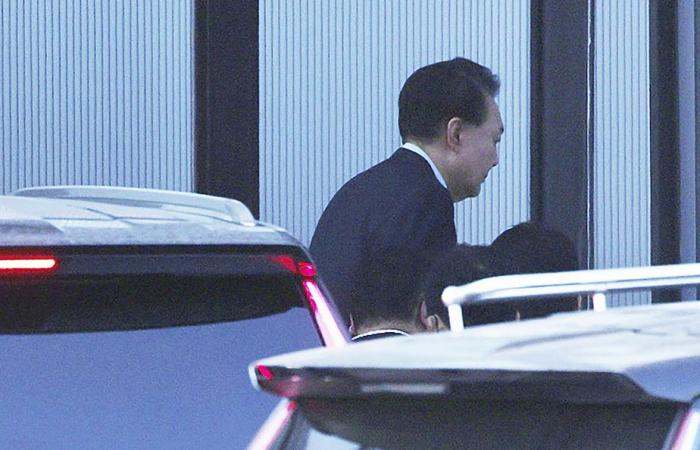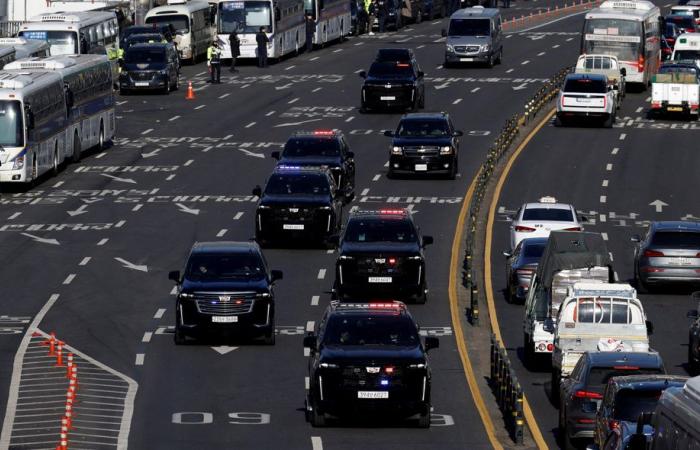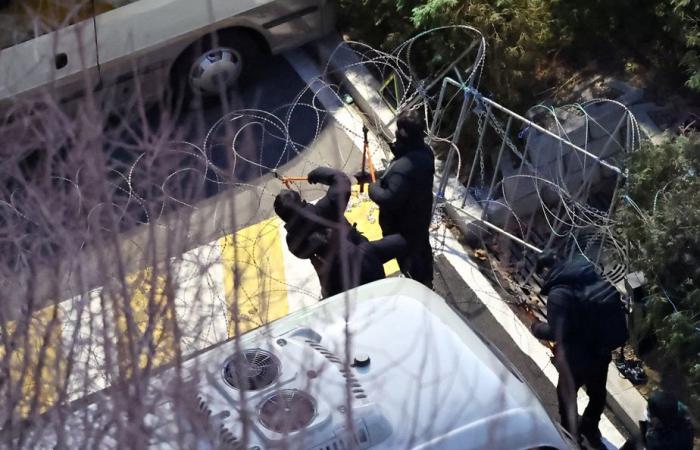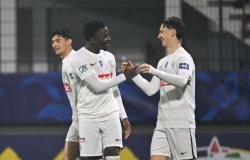(Seoul) South Korean President Yoon Suk-yeol was arrested Wednesday in an onslaught by investigators, an unprecedented measure reflecting the political crisis caused by his failed attempt to impose martial law in early December.
Posted at 4:20 p.m.
Updated at 10:56 p.m.
Hieun SHIN
Agence France-Presse
After an initial raid which turned into a fiasco in early January, agents from the Office for the Investigation of Corruption of High Personalities (CIO) and the police showed up in large numbers, before dawn, at the residence transformed into a fortress where the former prosecutor has been holed up for weeks in an upscale neighborhood of Seoul.
After having to cross the surrounding wall by ladders under the eyes of thousands of supporters of the right-wing leader, the team of prosecutors announced that they had apprehended him at 10:33 a.m. (8:33 p.m. Eastern time), before taking it to its premises.
PHOTO TYRONE SIU, REUTERS
A motorcade carrying South Korean President Yoon Suk-yeol after his arrest in Seoul
Never before has a sitting head of state been arrested in South Korea.
“I have decided to respond to the Corruption Investigation Bureau,” Mr. Yoon announced in a video message, adding that he did not recognize the legality of the investigation, but submitted to it “ to avoid any unfortunate bloodshed.”
Suspended by deputies and targeted by an investigation for “rebellion”, a crime punishable by death, Yoon Suk-yeol had until then always refused to explain himself, pushing prosecutors to resort to arrest warrants in order to to force him to do so.
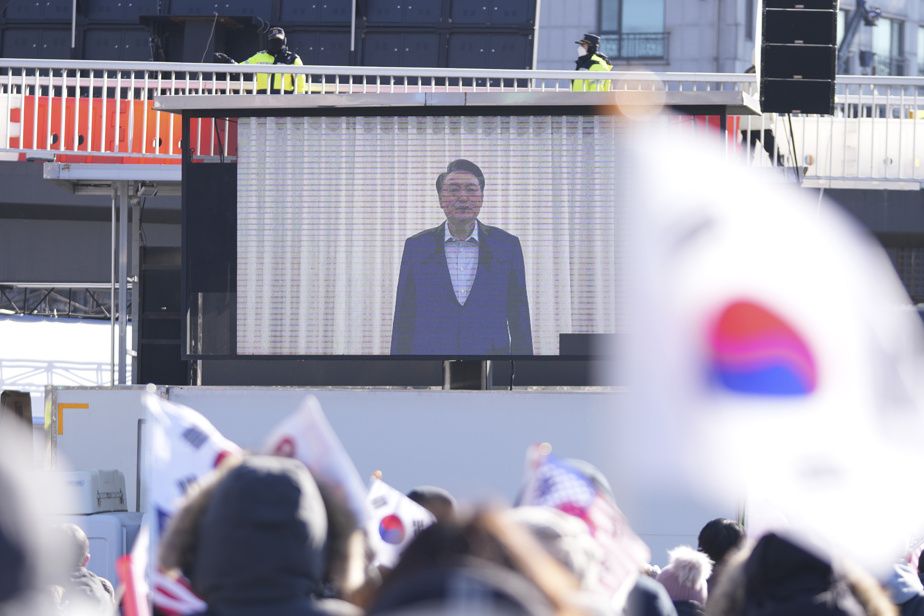
PHOTO LEE JIN-MAN, ASSOCIATED PRESS
A video of ousted South Korean President Yoon Suk-yeol is shown on a giant screen during a rally of his supporters in Seoul
His interrogation began at 11 a.m. local time (9 p.m. Eastern Time). He can be held in custody for 48 hours under the current warrant. Investigators will have to request a new one to possibly extend his detention.
Altercations
Under impeachment proceedings, Mr. Yoon is in turmoil for having briefly introduced martial law on December 3, a shock measure reminiscent of the dark hours of the military dictatorship. He then justified it by his desire to protect the country from “North Korean communist forces” and to “eliminate elements hostile to the State”.
In a Parliament surrounded by soldiers, the deputies had foiled his plans by voting on a text demanding the lifting of this state of exception. Put under pressure by elected officials, thousands of pro-democracy demonstrators and constrained by the Constitution, Yoon Suk-yeol had to comply.
On January 3, the Presidential Security Service (PSS), responsible for protecting heads of state, blocked the IOC’s initial attempt to execute the first arrest warrant against Mr. Yoon.
For their second raid, prompted by a new arrest order, the authorities had warned that they would apprehend anyone who obstructed them.
Brief altercations first broke out in front of the gate of the residence, where thousands of supporters were camped determined to defend Mr. Yoon, some chanting “Illegal mandate! », noted AFP.
Teams from the IOC and the police then had to cross the surrounding wall using ladders before getting past vehicle blockades.
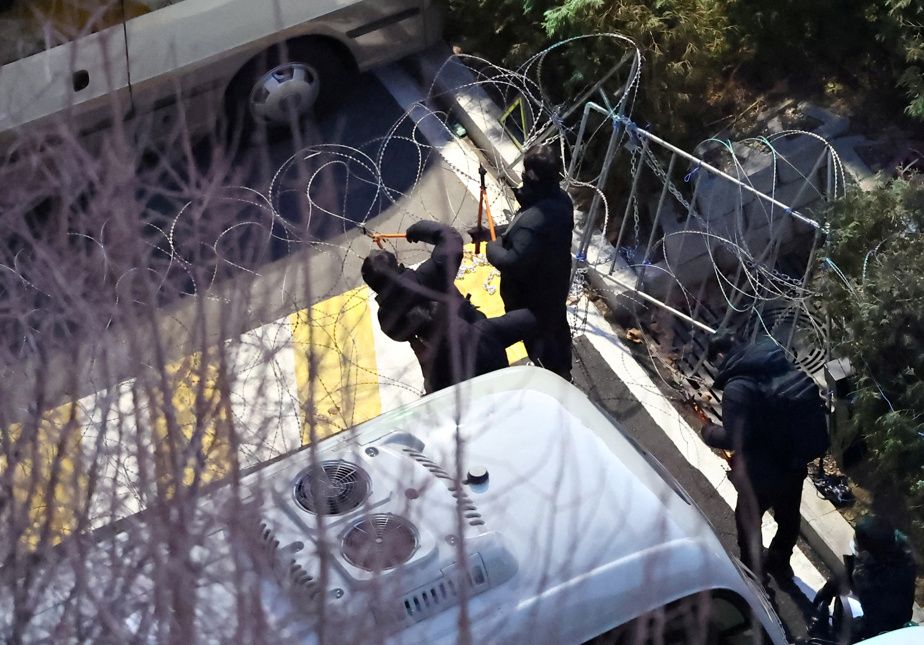
PHOTO YONHAP AGENCY, PROVIDED BY REUTERS
Police cut razor wire installed at the entrance to South Korean President Yoon Suk-yeol’s official residence before his arrest
Along the way, police arrested the PSS’s interim leader, Yonhap News Agency reported.
Very unpopular, Yoon Suk-yeol was suspended on December 14 following the adoption by the National Assembly of an impeachment motion.
“First step”
The arrest of Yoon Suk-yeol is “the first step towards the return of order”, welcomed Park Chan-dae, head of deputies of the Democratic Party (main opposition force) in Parliament.
“History will inevitably remember that the IOC and the police carried out an unjust and illegal mandate,” criticized Kweon Seong-dong, his counterpart from the People’s Power Party (PPP) from which Mr. Yoon comes.
With the chaos “over,” Parliament Speaker Woo Won-shik called for focusing “efforts on stabilizing state affairs and restoring people’s livelihoods,” as the economy has been shaken by this crisis which risks being prolonged.
The Court has until mid-June to rule on the motion for dismissal voted on December 14 by the deputies. Suspended, Mr. Yoon officially remains president while awaiting the verdict of the court which could permanently dismiss him and call elections, or reinstate him in his functions.
On Tuesday, the Constitutional Court formally launched its trial with a very short first hearing. Mr. Yoon did not show up, citing “concerns” about security.
The procedure will continue even without him. A second hearing is scheduled for Thursday.

